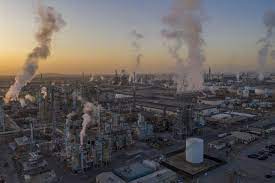Global climate warming slow down to 30% if we cut the Methane emissions

Image source : google
Quick and strategize full- scale effort to reduce methane emissions from the oil and gas industry to large scale agriculture, from livestock farming to fossil fuel extraction could slow the worldwide rate of planet warming by as much as 30%, a newly published paper in the journal Environmental Research Letters showed on April 27.
‘People talk about net zero in 2050 but what the temperature will be in 2050 will be determined by what we do now,’ says one author.
The study highlights the critical role of methane in any climate strategy, even as we decarbonize our energy systems. Reductions of methane emission could have a crucial impact in the global effort to limit warming below 2 degrees Celsius (3.6 Fahrenheit) compared to preindustrial levels — a central aim of the Paris climate accord.
By reducing emissions of methane, which has more than 80 times the warming power of CO2 for the first 20 years it’s in the atmosphere — by doing we can able to put the full stop on the increasingly rapid warming responsible for stronger storms, hotter fire seasons and rapidly melting Arctic sea ice, the Environmental Defense Fund said in a press release.
“Acting now and moving quickly to cut methane emissions is essential. Even modest delay would mean missing out on significant climate benefits. That’s an opportunity we won’t get back,” said the lead author of the research, Ilissa B. Ocko, senior climate scientist at Environmental Defense Fund. “To realize these climate benefits, decision makers need to address methane directly and not assume the problem will resolve itself as a result of policies to reduce CO2,” she added.
Compared to the amount of Methane which probably breaks down after about a decade, Carbon dioxide is far more abundant in the Earth’s atmosphere and can linger for hundreds of years. But in the short term, methane is far more effective at trapping heat — roughly 80 times more potent than carbon dioxide.
